| | | OFFLINE | | Post: 26.169
Post: 8.661 | Registrato il: 28/08/2005
Registrato il: 20/01/2009 | Administratore | Utente Master | |
|
 The Roman Rota is the highest appellate tribunal of the Roman Catholic Church, and is, with respect to judicial trials conducted in the Catholic Church, the highest ecclesiastical court constituted by the Holy See. The Catholic Church has a complete legal system, which is the oldest still in use today. The court is named Rota (wheel) because the judges, called auditors, originally met in a round room to hear cases. The Rota was established in the 13th century.
The Roman Rota is the highest appellate tribunal of the Roman Catholic Church, and is, with respect to judicial trials conducted in the Catholic Church, the highest ecclesiastical court constituted by the Holy See. The Catholic Church has a complete legal system, which is the oldest still in use today. The court is named Rota (wheel) because the judges, called auditors, originally met in a round room to hear cases. The Rota was established in the 13th century.
 The Pope's remarks to the Rota today are a bit less difficult to translate than last year's remarks. The difficulty comes from hie necessary employment of juridical terms and definitions that would make sense to anyone familiar with the grounds for obtaining canonical annulment of a marriage. But not to me - and I am not sure that my cursory reading about the causes for annulment
The Pope's remarks to the Rota today are a bit less difficult to translate than last year's remarks. The difficulty comes from hie necessary employment of juridical terms and definitions that would make sense to anyone familiar with the grounds for obtaining canonical annulment of a marriage. But not to me - and I am not sure that my cursory reading about the causes for annulment
www.ewtn.com/expert/answers/marital_consent.htm
has helped me give a proper translation of the part where he talks about 'simulated consent'... So, until the Vatican posts an official translation, here is a provisional account...
Pope addresses Tribunal of the Roman Rota
at start of Vatican's Judicial year:
Some considerations on faith and marriage
Translated from

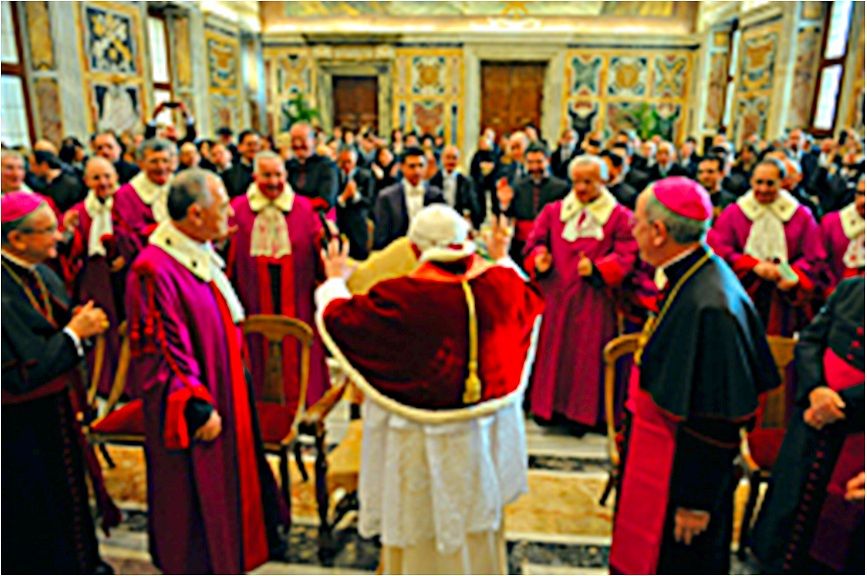
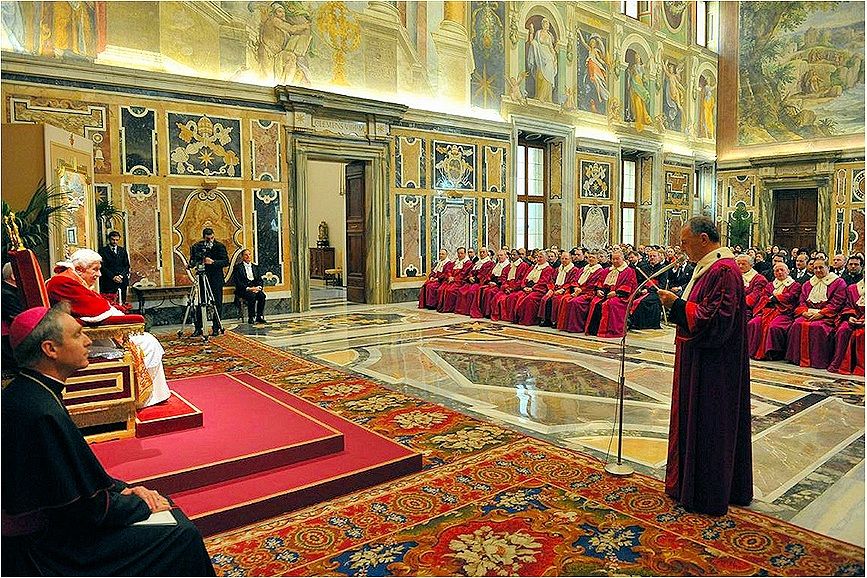
After a private audience with the recently appointed Dean of the Tribunal of the Roman Rota, Mons. Pio Vito Pinto, the Holy Father received the other officials, prelate-auditors and advocates of the Tribunal at the Sala Clementina of the Apostolic Palace to inaugurate the judicial year at the Vatican.
Here is a translation of his address to them:
Dear Members of the Tribunal of the Roman Rota:
It is an occasion of joy to be with you on the occasion of the inauguration of the judicial year. I thank your Dean, Mons. Pio Vito Pinto, for the sentiments he expressed in your name and which I reciprocate with all my heart.
This encounter gives me the opportunity to reaffirm my esteem and consideration for the high service that you are rendering to the Successor of Peter and to the whole Church, as well as to urge you to an even greater commitment in what is certainly a difficult task but one that is valuable for the salvation of souls.
The principle that salus animarum, the salvation of souls, is the supreme law in the Church (cfr CIC, can. 1752) should be kept in mind at all times and must find, in your daily work, its due and rigorous respect.
1. In the context of the Year of Faith, I wish to dwell especially on some aspects of the relationship between faith and matrimony, observing that the present crisis of faith in various parts of the world also bears with it a crisis in conjugal society, with all the weight of suffering and disquiet that this means even for the children.
We can start off from the common linguistic root that the terms fides and foedus have in Latin - the latter term used in the Code of Canon Law designates the natural reality of matrimony as an irrevocable pact between a man and a woman (cfr can. 1055 § 1). Indeed, reciprocal trust is the irrenunciable basis of any pact or alliance.
On the theological plane, the relationship between faith and matrimony assumes an even more profound significance. Indeed, the spousal bond, although it is a natural reality, was elevated by Christ, for those who have been baptized, to the dignity of a sacrament (cfr ibidem).
The indissoluble alliance between a man and a woman in marriage does not require, for purposes of sacramentality, the personal faith of the spouses. What it requires, as the minimum necessary condition, is the intention to do what the Church does.
But although it is important not to confuse the question of intention with that of the faith of the contracting parties, it is nonetheless not possible to separate them totally. As the International Theological Commission noted in a 1977 document, "in case there is no trace of faith as such (in the sense of a disposition to believe), nor any desire for grace or salvation, then the problem is whether the intention to marry is truly sacramental as earlier mentioned, whether that intention is present or not, and if the marriage has been validly contracted or not" (La dottrina cattolica sul sacramento del matrimonio [1977], 2.3: Documenti 1969-2004, vol. 13, Bologna 2006, p. 145).
Blessed John Paul II, addressing this Tribunal ten years ago, nonetheless pointed out that "an attitude by the persons getting married that does not consider the supernatural dimension of marriage can render it invalid only if it undermines the validity on the natural plane upon which the sacramental sign is imposed" ibidem). [Original Italian of the clause I highlighted: "solo se ne intacca la validità sul piano naturale nel quale è posto lo stesso segno sacramental" - I believe I have translated it as best I can, but I do not understand what is meant by 'validity on the natural plane'.]
This problem, especially in the present context, requires further reflections.
2. Contemporary culture, which is characterized by marked ethical and religious subjectivism and relativism, poses urgent challenges to the individual and to the family.
In the first place, there is the question of the capacity of the human being to bind himself to someone else, and if a bond that lasts for life is truly possible and corresponds to human nature, or whether it is not instead opposed to man's freedom and his self-realization.
It is, in fact, part of a widespread mentality, to think that a person becomes himself by remaining 'autonomous', coming in contact with others only through relationships that can be interrupted at any time (cfr Allocution to the Roman Curia, December 21, 2012).
No one can miss the fact that a person's basic perspective influences his choice of whether to enter into a bond that will last all his life, depending on whether that perspective is anchored to a merely human plan, or is opened up by the light of faith in the Lord.
In fact, only by opening oneself to the truth of God is it possible to understand and to realize - even in the concreteness of one's conjugal and family life - the truth of man as a child of God, regenerated at Baptism.
"Whoever remains in me and I in him will bear much fruit, because without me you can do nothing." (Jn 15,5). This is what Jesus taught his disciples, reminding them of the human being's substantial incapacity to fulfill by himself what is necessary to achieve true good.
Rejection of the divine proposal, in effect, leads to a profound disequilibrium in all human relationships (Cfr Address tothe International Theological Commission, December 2012), including the marital, and facilitates a mistaken understanding of freedom and self-realization, which, along with seeking to escape from suffering, condemns man to enclose himself within his egoism and egocentrism.
On the contrary, acceptance of faith makes man capable of self-giving, in which alone "does man find himself... Only by opening himself to the other, to others, to children, to the family, only by letting himself be changed through suffering, does he discover the breadth of his humanity" (Address to the Roman Curia, December 21, 2012).
Faith in God, sustained by divine grace, is therefore a very important element in order to live in mutual dedication and conjugal faithfulness (Catechesis, General Audience, June 8, 2011).
This must not be taken to mean that faithfulness, along with other characteristics, is not possible in natural marriage that takes place between those who are not baptized. In fact, such marriages are not devoid of good things that "come from God the Creator" and which are found in the spousal love that unites Christ and the Church" (International Theological Commission, Catholic Doctrine on the sacrament of matrimony [19], 3-4).
But certainly, being closed to God or rejection of the sacred dimension in the conjugal union and of its value in terms of grace, renders difficult the concrete incarnation of that most elevated model of matrimony conceived by the Church according to God's design, and can even undermine the validity itself of the alliance, whenever - as the consolidated jurisprudence of this Tribunal says - it translates into a rejection of the conjugal obligation of faithfulness or of other elements and properties essential to matrimony.
Tertullian, in his famous Letter to the Wife, speaking of conjugal life marked by faith, writes that Christian spouses are "truly two in one flesh only, and where there is one flesh, there is one spirit. Together they pray, together they prostrate themselves, together they fast; one teaches the other, one honors the other, one sustains the other" (Ad uxorem libri duo, II, IX: PL 1, 1415B-1417A).
St. Clement of Alexandria expressed himself in similar terms: "If in fact, for both spouses, there is only one God, then for both, there is only one Pedagogue - Christ; and one Church, one wisdom, one humility. We est in common, matrimony unites us... And if our life is common to both of us, then also common to both of us is grace, salvation, virtue, morality" (Pædagogus, I, IV, 10.1: PG 8, 259B).
The saints who experienced matrimonial union and family life in the Christian perspective, succeeded in overcoming even the most adverse situations, even gaining the sanctification of their spouses and children through a love that was always strengthened by solid trust in God, by sincere religious piety, and by an intense sacramental life.
Their experiences, distinguished by faith, help us understand why even today, there is value to the sacrifice offered by the abandoned spouse or someone who underwent divorce, if - recognizing the indissolubility of a valid matrimonial bond - the spouse does not allow himself/herself to "be involved in a new union... Because in such cases, the example of faithfulness and Christian consistency assumes a special value of witness to the world and to the Church" (John Paul II, Apost. Exh. Familiaris consortio [22 novembre 1981], 83: AAS 74 [1982], p. 184).
3. Finally, I wish to dwell briefly on the bonum conjugium ['the good of the marriage', more commonly translated as 'the good of the spouses' in all canon law discussions of marriage]. Faith is important in the realization of authentic conjugal good, which consists in wanting, always and under all circumstances. what is good for the other, as a function of a true and indissoluble consortium vitae (life in common).
Indeed, the goal of Christian spouses to live a true communio conugalis contains a dynamism that comes from the faith, in which one's confessio or personal response to the salvific announcement of Christ involves the believer in God's plan of love.
Confessio and caritas are "the two forms by which God involves us, makes us act with him, in him, and for mankind, for his creature... Confessio is not an abstraction, it is caritas, it is love. Only thus is it a reflection of divine truth, which as truth, is inseparable from love" (Meditation, First General Congregation of the XIII Ordinary General Assembly of the Bishops' Synod, Oct. 9, 2012)
Only through the flame of charity is the presence of the Gospel no longer just words, but lived reality. In other words, if it is true that "faith without charity does not bear fruit, and charity without faith would be a sentiment constantly at the mercy of doubt", one must conclude that "faith and charity each require the other, in such a way that each allows the other to set out along its respective path" (Apost Ltr Porta Fidei, October 11, 2012).
4. If this is valid in the wide context of community life, it must be even more valid in the matrimonial union, in which faith makes the love of the spouses grow and fructify, making room for the presence of the Trinity, and making conjugal life, thus lived, 'happy news' in the eyes of the world.
I recognize the difficulties, from a juridical and practical viewpoint, of enucleating the essential element of the bonum coniugum that has been understood till now prevalently in relation to the hypothesis of incapacity (cfr CIC, can. 1095).
The bonum coniugum assumes relevance even in the case of simulated consent. Certainly, in the cases subject to your judgment, factual inquiry will seek to ascertain the ultimate validity of this cause for nullification, prevalent or coexistent with one other cause related to the three Augustinian benefits of marriage - procreativity, exclusivity and perpetuity.
One must therefore not disregard cases in which, precisely because of the absence of faith, the benefits of marriage to the spouses become compromised or excluded from their consent itself. For example, in a hypothesis of subversion by one of the spouses, because of a mistaken idea of the marriage bond or the principle of parity, or rejection of the [physical] union that characterizes the matrimonial bond, related to the possible coexistent exclusion of faithfulness and the use of copula adempiuta humano modo. ['Copulation carried out in the human way'? I think the sense of the highlighted clause, in a list of examples of how the marriage bond can be subverted, is that additional aggravating circumstances may be unfaithfulness or copulation in unnatural ways.]
With these considerations, I certainly do not intend to suggest any facile automatic equivalence between lack of faith and invalidity of the matrimonial union, but rather to point out how such lack of faith may, though not necessarily, damage even the benefits of matrimony, since the natural order intended by God is inherent to the conjugal pact (cfr Gen 2,24).
Dear Brothers, I invoke the help of God for you and all those in the Church who do their best to safeguard truth and justice with regard to the sacred bond of matrimony and therefore of the Christian family.
I entrust you to the protection of the Most Blessed Mary, Mother of Christ, and of St. Joseph, Guardian of the Family of Nazareth, silent and obedient executor of the divine plan of salvation, as I gladly impart the Apostolic Blessing to you and those dear to you.
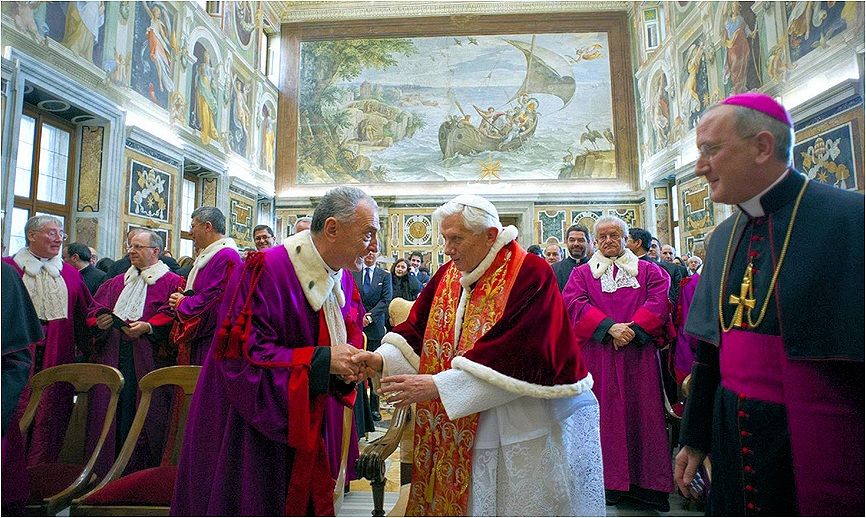
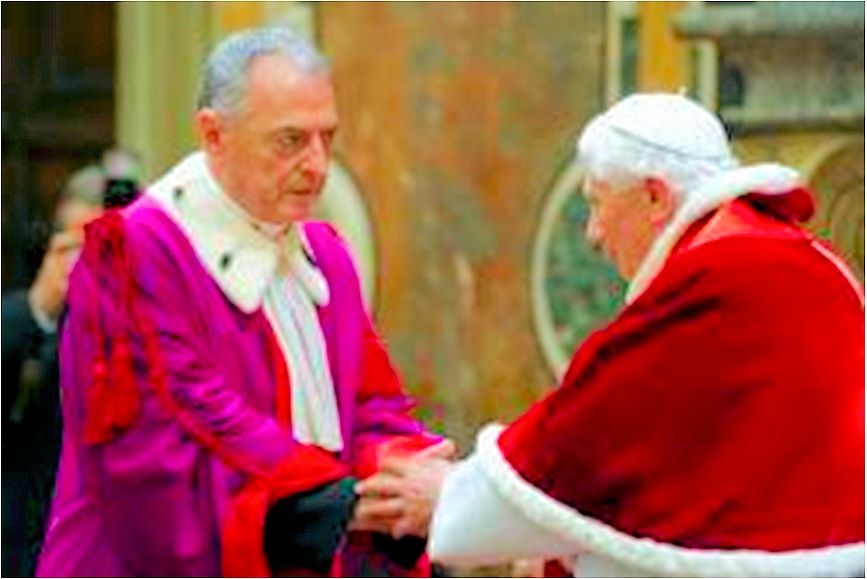
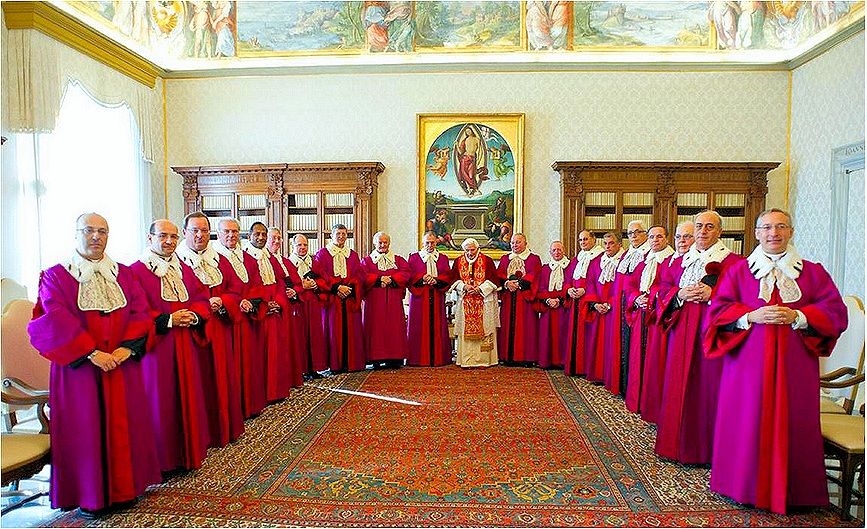 P.S. Andrea Tornielli has a commentary on this address which, for some reason, he interprets as yet another signal from Benedict XVI that the question of divorced Catholics who remarry remains 'open'. But the Pope limits his comments here to marriages that may or may not be annulled on the basis alone of 'lack of faith' by the contracting parties - and he cites examples of such lack of faith.
P.S. Andrea Tornielli has a commentary on this address which, for some reason, he interprets as yet another signal from Benedict XVI that the question of divorced Catholics who remarry remains 'open'. But the Pope limits his comments here to marriages that may or may not be annulled on the basis alone of 'lack of faith' by the contracting parties - and he cites examples of such lack of faith.
This is completely tangential to the problem of divorced Catholics who remarry, because one assumes - in the absence if any figures ever being cited when these stories come up - that 1) very few of the cases that reach the Roman Rota involve divorcees seeking to have their first marriages canonically annulled (if only because, in general, the incidence of annulable marriages is quite insignificant); and 2) among those who could conceivably seek canonical annulment of their first marriage, how many could cite 'lack of faith' as described by the Pope as grounds for seeking the annulment? They can try, anyway.
Actually, a practical first advice to all Catholic divorcees who remarry and then complain that they 'suffer' because they are denied communion, might be to try and have their first marriage annulled if they have a viable case for it, because once they get an annulment, they will no longer be 'excommunicated'. Their alternative is to commit themselves to a chaste relationship with their present spouse, and I doubt they are willing to do that unless they are a;ready in their 80s, or something...
[Look, folks, you went through divorce and remarriage with open eyes and great determination, knowing full well the consequences in terms of not being allowed to receive Communion. It's unsportsmanlike to now behave as though you were being discriminated against by the Church. Actions have consequences: Man up and live with the consequences of your actions. Or do something to remedy it if it;s possible. It's not for the Church to enact what amounts to class legislation in your behalf!]
I will nonetheless translate Tornielli's commentary because he assembles statements that Joseph Ratzinger/Benedict XVI has made over the years about the problem of remarried divorcees. {About whom one must conclude they think of themselves as a special class or interest group who must be exempt from the Church teaching on the indissolubility of marriage, in much the same way as LGBTs think they deserve special 'rights' because they are different from the overwhelming majority of society.)... And as I always intuited or gathered from what he has said, I don't think he will ever impose a one-rule-fits-all for these cases, but let the local bishop decide individual cases following guidelines given by the Vatican.
[Modificato da TERESA BENEDETTA 27/01/2013 13:57] |